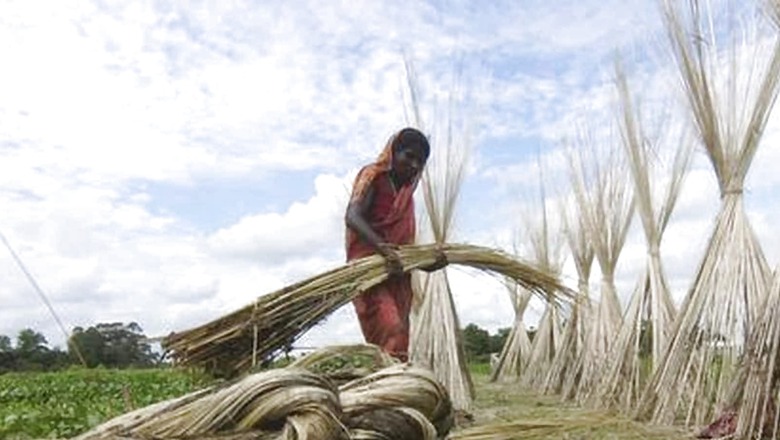
views
Jute this time has become the latest catalyst of politics in West Bengal. On Thursday evening, the central government came up with a notice of withdrawal of the price cap for the fibre, a decision that has significant political ramifications.
Sources in the Bharatiya Janata Party said the action has been taken to retain West Bengal MP Arjun Singh in the party as, after a meeting with JP Nadda this week, the Lok Sabha lawmaker told reporters that the coming 15 days would determine whether he would stay in the BJP or not.
The price cap of Rs 6,500 per quintal on raw jute imposed by the Centre in September was seen as pushing Arjun Singh towards his former party Trinamool Congress.
The MP had opposed the step in Parliament itself. Singh represents Barrackpore, which is part of the “jute belt” of Bengal. He was of the opinion that the price ceiling would affect mill workers and MSMEs. Experts said the move would dent Singh’s vote bank as well.
The BJP MP wrote a letter to textile minister Piyush Goyal, stating that if nothing was done in seven days, he would start an aggressive protest.
As seven days passed, Arjun Singh was called by the union minister who gave a patient hearing to his demands.
Goyal directed him to meet the textile secretary, giving him the assurance that the problem would be solved.
Subsequently, Singh said he was happy that initiatives were taken but he would not be satisfied with a “lollipop”. Not just words, he wanted to see some action.
Singh also wrote a letter to West Bengal chief minister Mamata Banerjee and sought her intervention. He also communicated this to other CMs. Amid all this, the BJP MP skipped the party’s Sankalp Yatra which escalated the buzz of his possible return to the TMC.
Following Singh’s demand, a tripartite meeting was held on May 9. The ministry of jute and other stakeholders were present there. The Bengal labour secretary too attended the meeting. He opposed the idea of a maximum price being set for products like jute. Bengal also demanded 100 per cent reservation on the packaging of foodgrain in jute bags.
The jute row had its biggest effect in Bengal. About a dozen mills closed and more than 60,000 workers were put out of work. This situation was conveyed to the central ministry.
The moment the ceiling was set for the prices of raw jute, an artificial demand was created in the market, say experts. No one was ready to sell jute at that price.
The TMC trade union also took up the issue and got moral support from Arjun Singh, who was constantly making fierce comments on the matter.
The Indian Jute Mills Association also requested the Jute Commissioner to up the price to Rs 7,200, which was denied. The IJMA went to court, which also asked the Jute Commissioner how this demand could be fulfilled.
Arjun Singh too was constantly mounting pressure on his own party leadership. He was called a second time by textile minister Piyush Goyal and an assurance was given that his demand would be fulfilled.
Not only that; party chief JP Nadda too called the MP. Sources say Arjun Singh hinted there that if the price cap did not go, he could move back to the TMC.
Within two days of this meeting, the maximum price was withdrawn.
Arjun Singh called Piyush Goyal and thanked him, while he also tweeted on the matter.
https://twitter.com/ArjunsinghWB/status/1527260428463706112?cxt=HHwWgMC44ZLR9bEqAAAA
Another BJP Bengal MP Locket Chatterjee also took to the social media site to thank the textile ministry.
https://twitter.com/me_locket/status/1527257413430128641?cxt=HHwWgsCtgdOh9LEqAAAA
The TMC too did not want to be left behind in claiming credit for the development. Ritabrata Banerjee, state incharge of the Indian National Trinamool Trade Union Congress (INTTUC), also tweeted.
https://twitter.com/RitabrataBanerj/status/1527284810950901760?cxt=HHwWgICgubLcgLIqAAAA
Arjun Singh had moved to the BJP from the TMC ahead of the 2019 Lok Sabha polls. He defeated Trinamool’s Dinesh Trivedi to become the MP from Barrackpore.
Read all the Latest Politics News here

















Comments
0 comment